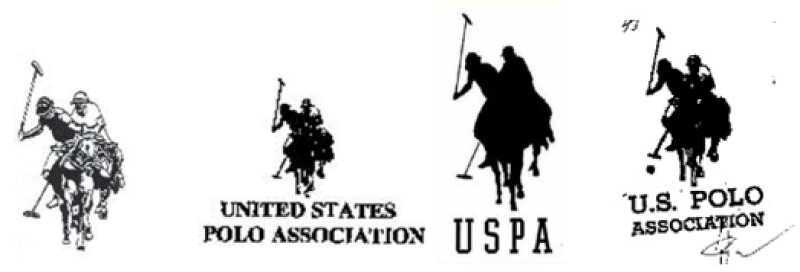In a recent judgment in an opposition case before the Greek Trademarks Office, the Administrative Trademarks Commission issued a decision reaffirming the similarity between composite marks containing figurative elements and words.
The opponent is the owner of the following series of trademarks:

The contested application was the following:

In its ruling, the Administrative Trademarks Commission described the figurative elements of the marks in detail, as follows: “The dominant element of the marks under comparison is the depiction of two polo players on horseback, facing forward in an instance of action from the game. Indeed, the compared representations are also substantially similar in their individual characteristics, since they are in black and white (background) and the players are shown on horses galloping forwards, wielding mallets in an active snapshot of the game, one of which is shown in a bottom-up position (with its base at the top) and the other in a top-down position (with its base at the bottom).
“The said representation is in the centre of the opposed mark and is more than four times the size of the words in the same mark. It, therefore, follows the corresponding pattern of the opponent's earlier marks, where the essentially identical representation is the dominant element, both because of its position and because of its size.”
In addition, regarding the word elements of the marks in question, the decision concluded: “Given the length of the set of verbal elements comprising the contested trademark, it is reasonable that the average consumer will be content to pronounce the verbal element which appears first, namely the word ‘Dipolon’. […]
“The average consumer will therefore understand that this word is conceptually linked to the dominant representation, namely polo, and is substantially similar to the word ‘Polo’ in the opponent's marks, which is also conceptually linked to the dominant representation of the opponent's marks as described above.”
The Administrative Trademarks Commission reached these conclusions not only citing settled EU case law (T-168/04, C-342/97, C-498/07, T-581/13, etc.) but also stressing that the aforementioned jurisprudential principles applied in Greece long before the aforementioned EU case law.
It is very reassuring that the Administrative Trademarks Commission has issued such a well-reasoned decision, with extensive references to, and descriptions of, the respective marks, and showing a thorough knowledge of EU and national case law. It is hoped that this will set a precedent for future decisions issued by the Greek Trademarks Office.












